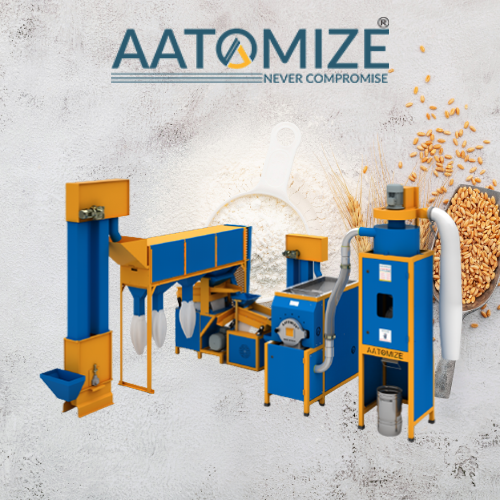
How Flour Mill Plant Manufacturers Are Shaping the Future of Grain Processing
Introduction
The grain processing industry is at an exciting crossroads, evolving rapidly due to new technologies, changing consumer tastes, and a growing emphasis on sustainability. At the heart of this transformation are flour mill plant manufacturers, like AATOMIZE, who are not just building machinery but are actively shaping the future of how we process grains. In this article, we’ll explore the pivotal role these manufacturers play and how their innovations are influencing the food we eat.
The Automation Revolution in Flour Milling
Imagine walking into a flour mill where machines hum with precision, working tirelessly to produce flour with minimal human intervention. This is the reality that automation has brought to the flour milling industry. Flour mill plant manufacturers are harnessing cutting-edge technology to streamline production processes.
Automated systems monitor crucial factors such as temperature and moisture levels in real time, ensuring consistent quality and efficiency. For instance, with the latest automated milling systems, adjustments can be made on the fly to maximize yield and minimize waste. This not only increases productivity but also helps mills reduce their environmental footprint by conserving energy and resources.
A Commitment to Sustainability
In today's world, sustainability is more than just a buzzword; it’s a necessity. Flour mill plant manufacturers are stepping up to the plate by implementing eco-friendly practices in their operations. Companies like AATOMIZE are leading the charge, focusing on renewable energy sources and energy-efficient technologies in their mill designs.
By integrating solar panels or wind energy into their operations, these manufacturers are significantly reducing their reliance on fossil fuels. Additionally, innovative waste management practices are repurposing byproducts from the milling process, turning what would be waste into valuable resources, such as animal feed or biofuels. This commitment to sustainability not only benefits the environment but also appeals to consumers who increasingly prefer eco-conscious brands.
Innovations Driving Change
Innovation is the lifeblood of the flour milling industry. Manufacturers are constantly seeking new ways to improve efficiency and quality, and they are investing heavily in research and development.
For instance, the revival of stone milling offers a traditional yet health-conscious approach to flour production. By using natural stones, these mills produce flour that retains more nutrients and flavor, catering to the growing market for organic and whole-grain products. Additionally, advancements in high-precision milling technologies ensure that flour meets specific baking needs, whether for artisan bread or commercial baking.
Meeting Changing Consumer Demands
Today’s consumers are more health-conscious and discerning than ever before. The demand for specialty flours, such as gluten-free or ancient grain varieties, is on the rise. Flour mill plant manufacturers are adapting by designing versatile systems that can handle a wide range of products without cross-contamination.
For example, dedicated gluten-free milling systems are specifically engineered to prevent any trace of gluten, ensuring that those with dietary restrictions can enjoy safe, quality flour. By embracing these changes, manufacturers are not only meeting market demands but are also playing a crucial role in making healthy options accessible to everyone.
Ensuring Quality at Every Step
In the world of food production, quality is king. Flour mill plant manufacturers recognize that maintaining high standards is essential for success. They are implementing rigorous quality control measures at every stage of the milling process.
From sourcing raw grains to final product testing, manufacturers are using advanced technologies like digital tracking systems to ensure transparency and accountability. This commitment to quality builds trust with consumers, who are increasingly concerned about the origins of their food and its quality.
Collaboration: The Key to Success
The challenges and opportunities in the grain processing industry are best tackled through collaboration. Flour mill plant manufacturers are forging partnerships with farmers, researchers, and food scientists to drive innovation and improve practices.
By working together, they can share valuable insights and knowledge, enabling manufacturers to develop milling technologies that meet the real-world needs of producers and consumers alike. This collaborative spirit is essential for creating a resilient and sustainable grain processing ecosystem.
Embracing the Digital Future
Digital technology is revolutionizing the grain processing industry. Flour mill plant manufacturers are leveraging tools such as artificial intelligence, the Internet of Things (IoT), and big data to enhance their operations.
For example, AI can predict maintenance needs, allowing manufacturers to address issues before they become major problems, thereby minimizing downtime. IoT devices enable real-time monitoring of equipment performance, ensuring optimal efficiency. This digital transformation is not just about improving productivity; it’s about creating a more responsive and competitive industry.
Conclusion
Flour mill plant manufacturers like AATOMIZE are not just suppliers of machinery; they are integral players in the future of grain processing. By embracing automation, sustainability, and innovation, they are shaping a more efficient, eco-friendly, and consumer-focused industry.
As we look ahead, the role of these manufacturers will only grow in importance. Their commitment to quality and adaptability in a changing landscape ensures that they will continue to meet the demands of modern consumers and contribute to a sustainable future. In doing so, they are not just milling flour; they are milling a better world for all of us.